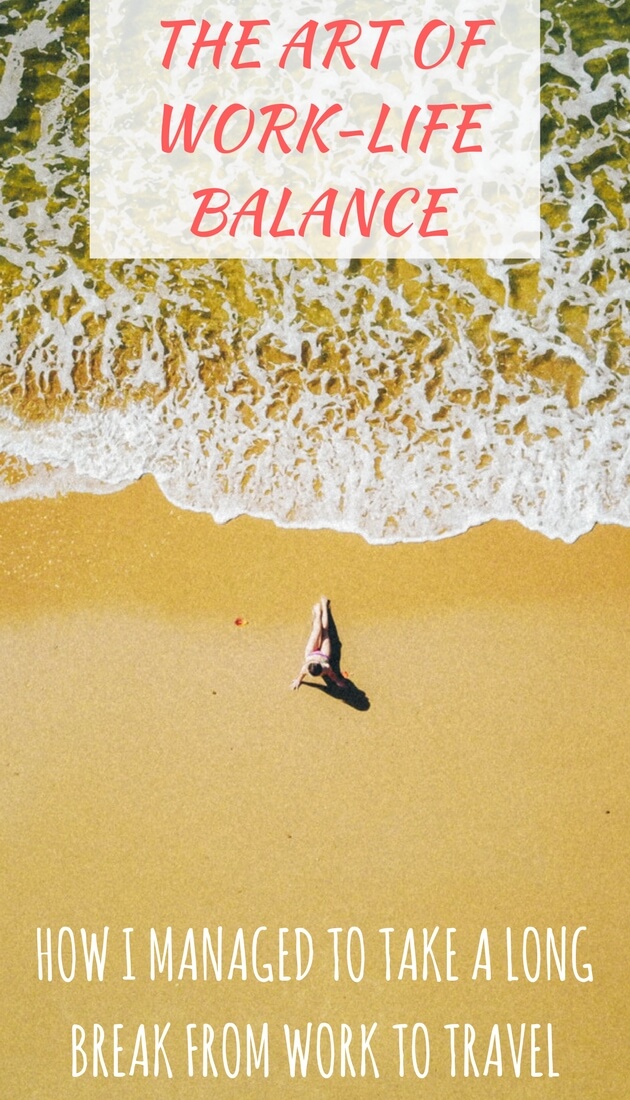
This post may contain affiliate links. I receive a small commission at no cost to you when you make a purchase using my link.
I have to admit, I can hardly tolerate inflexible working environments.
I think we all need a proper break from work from time to time. There, I said it and I probably won’t be elected a president or hired to be a Germain train driver.
The truth is, the trends are changing. These days, talented people with valuable skills dictate the rules of the game and they shift it towards flexibility. Millennials are different, we don’t want the ‘work until you drop’ mentality. More value is placed on knowledge and freedom, rather than working long hours and getting yourself into debt buying things that only tie you down. And the market starts to respond to that, more and more companies offer location independent positions, meaning you can work from wherever you want.
Work-life what?
Ever heard of work-live balance?
I haven’t until I moved to Denmark and discovered the true meaning of the term. And just so we are all on the same page, here’s a definition of ‘work-life balance’ from Wikipedia:
Work–life balance is a concept including proper prioritizing between “work” (career and ambition) and “lifestyle” (health, pleasure, leisure, family and spiritual development/meditation).
That’s why when I remember my first official job in one of the Big 4 audit firms, I shrug. They seemed to be uninterested in anything about me, apart from sucking as many work hours as possible for a fixed monthly salary. This was the environment where taking a lunch break was frowned upon and dare you go home earlier than 7 or 8 PM! The longer hours you worked, the better!
I never understood that philosophy. All that does is drives tired people to madness. But in reality, it simply pinpoints that you are not doing your job efficiently enough to complete it within designated hours.
- Recommended Reading: Rework
by Jason Fried.
While an exciting job is emotionally satisfying, I always thought that there must be more to life than just work. Especially if you’re not running your own business.
And since you are reading this blog, that other thing is probably traveling, just like it is for me.
Work Or Travel?
It is not the question of either or. It’s like deciding whether you should eat or drink.
I am not the one who’s going to tell you to just quit your job and travel the world. You do need money and you might even have the job that you genuinely value, so why quit to travel? How about taking a longer break from work instead?
How I got a month off work to travel?
All you busy bees who work full-time know that taking a long break from work at a time is not an option unless it is a maternity leave. But when I was buying flight tickets to travel Australia for six weeks, I knew I could pull it off. The trip was a year ahead, so I was confident I will figure something out by the time it came.
Soon, a new job possibility came along, which I decided to pursue. And as the negotiations with my new boss went along, I thought it was a perfect time to bring up my long vacation. Why? There are only a few moments in your career when you have the possibility to negotiate your package and the best time is when you are changing jobs. I thought to myself:
- if they really want me, they will let me go for six weeks
- not telling them about my planned vacation right away seems unfair. It also gives them the control to deny it once I already agreed to the job. On the other hand, saying “I will take a longer leave in half a year or so” sounds much easier to swallow because no one knows what the workload will be like in the future. Also, it put the control back in my hands. They can either take it or leave it.
So, that’s what I did. I announced my plans and was firm in saying that I am not able to change them. And just as I expected, they said yes to the whole package, meaning taking me in with my vacation plans. Allowing me to do this, my work environment became so much more attractive, as I felt that my personality and my passions are being understood and supported.
Working remotely: Building trust and being responsible
The whole idea of working remotely is based on trust. Your employer needs to trust that your job will be done on time with the same level of quality it would be done in the office. Therefore, it is up to you to ensure that and make your manager feel confident. On your end, you have to be responsible and live up to those expectations.
A year ago I had to travel back to Ukraine to have my wisdom tooth removed. It was an unpleasant procedure that involved stitches and observance of doctors for at least 10 days. Instead of taking a sick leave, I talked to my manager explaining the situation and proposing to work from Ukraine. Since all my stakeholders were located in different parts of the world, and we communicated purely by phone or email, I didn’t have to be in the office. He said yes and instead of looking for a replacement, he had the work done without any interruptions. I attended all conference calls, made myself available in same work hours and answered my emails timely. No one could even tell that I was running the global implementation project from my a village in Ukraine for three weeks!
At the same time, I had a chance to fix my teeth and be with my family. I call it a win-win.
All this time my manager didn’t attempt to micro-manage me. He trusted that I would get my job done and thanks to that I wasn’t drowning in guilt of being away from the office.

Catching sun rays at my house in Ukraine
You can make it work, too..
What I am trying to say is that no matter the job, you should be able to enjoy your life and seek out what’s best for you. If your job holds you from doing the things you want, sooner or later you’ll start hating it and quit anyways. If you are stuck in a rigid environment that doesn’t embrace flexibility, maybe it is not a place for you and you should look for something else instead.
But my examples of being able to do it while keeping a full-time permanent position show that sometimes all you need to do is ask.
We are the engineers of our own happiness. If you sit and do nothing, the changes you wish for might never come. I’ve learned that in order to have my rights and wishes taken into consideration, I have to speak up. And those who do, usually get more than those who don’t.
Believe in yourself, know your self-worth and take actions to get things you truly deserve.
Like It? Pin It!
Do you also shuffle a full-time job and a thirst for travel? How do you manage? Share your experiences in comments below.



Finding a work life balance can be so tough! Especially with blogging coming into the equation as well! You’re absolutely right that companies who value our hard work could let us travel (un-paid) for a few weeks. My brother managed a 3 month Asia backpacking trip as a sabbatical from work… and they let him simply because they didn’t want him to just quit completely! I have yet to try this myself though… 😉
Oh I so wanted this inspo! Working full time and still travelling is fun too 🙂
It’s a hard one! I quit a job I really liked to take another opportunity abroad and sometimes wonder if I made the right decision. Yet, it’s the decision I made and I ultimately had a really great time travelling and living overseas, so I won’t regret it. Agreed that this trend of working long hours and being expected to give your all to a job is unpleasant and unsustainable. Sometimes you just have to take a risk and trust that everything will work out okay in the end.
Your post and experience are so motivating, Lena! Working remotely seems like a great concept!